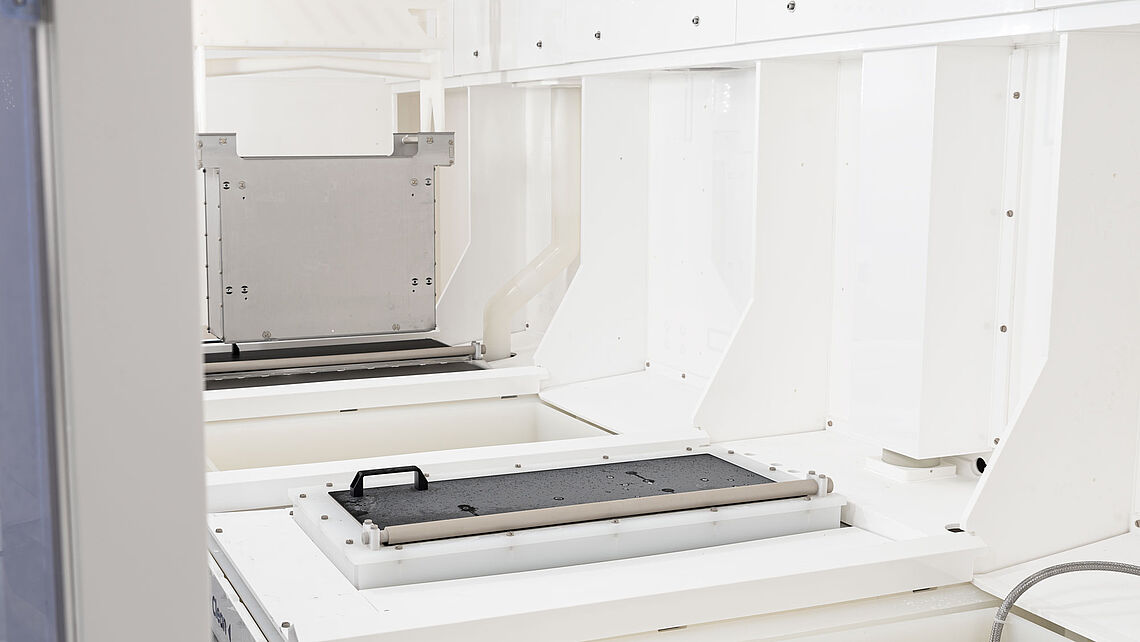July 15, 2025
RENA Technologies Commissions High-Tech-Processing Facility for TGV Glass Substrates

RENA Technologies, a leading manufacturer of wet processing equipment for semiconductor and advanced packaging production, today announced the ramp-up of its dedicated glass core substrates facility in Germany. This new line, designed for substrates up to 510 × 515 mm, immediately opens for customer test lots, underscoring RENA's proven expertise in glass processing and creating new opportunities for process development and customer sample production. “As experts in precision wet processing, we can now offer large panel demo services for high aspect ratio through glass via (TGV) formation on various glass types,” said Dr. Holger H. Kuehnlein, SVP Technology at RENA. “Our alkaline based TGV process delivers extremely small taper angles, low sidewall roughness, and exceptional dimensional control at panel scale, enabling high density via applications. Customers can begin validating these capabilities today.”
Why Glass, and Why Wet Processing?
Glass substrates offer significant advantages for advanced electronics, including ultra-flat surfaces, low dielectric loss, and superior thermal stability. However, realizing these benefits at scale requires defect free surface preparation and the formation of uniform, high density TGVs with minimal taper angles. RENA`s wet processing systems are specifically designed to address both challenges:
Surface Engineering – Our systems ensure precise cleaning and stress relief across 600 x 600mm panels with submicron total thickness variation (TTV).
Chemically Formed TGVs – Following initial laser modifications performed by our specialist partners, RENA’s proprietary chemistries form, enlarge and shape each via to exact specifications. This process consistently delivers very small taper angles and smooth sidewalls, ideal for subsequent metallization.
By collaborating with leading German and international laser partners, RENA offers customers the flexibility to choose their preferred laser vendor while ensuring all downstream wet processing steps are handled by our advanced equipment.
Key Highlights of the New Facility
Panel Size : Focus on 510 x 515mm and up to 600 × 600mm, smaller possible
Tool Set: Alkaline TGV etching, advanced rinse/dry, optical inspection & metrology
Field-Proven Recipes: Process conditions migrated from high volume tools
On-Demand Access: Customers may run demo substrates, qualify custom chemistries, or request full process flows
Sustainability: Low temperature chemistries and closed loop water reclamation reduce energy and ultrapure water (UPW) consumption
Market Impact
High-Performance Computing (HPC) as well as 5G/6G RF modules increasingly require new package designs, including panel-level fan-out and trend towards more complex chiplet architectures. Glass substrates, long considered the “holy grail” for core and interposer material, effectively eliminate the limitations imposed by warpage and dielectric loss in organic substrates. By combining laser modification from our vetted partners with RENA’s chemistry driven via shaping, designers can now validate glass packaging concepts on the lab-platform proven at 600x600mm dimensions.
“With this lab-tool, we've created a great opportunity for semiconductor manufacturers to perform demos on panel level glass substrates,” added Peter Schneidewind, CEO of RENA. “From surface preparation to via formation, our wet process flow is ready for customers substrates to support TGV technology breakthroughs. This is world class made in Black Forest.”
Availability & Engagement Model
- Testing available now
- Flexible collaboration: Bring your own laser modified substrates, or leverage RENA’s ecosystem partners to benefit from joint process development support, and metrology services for process validation.